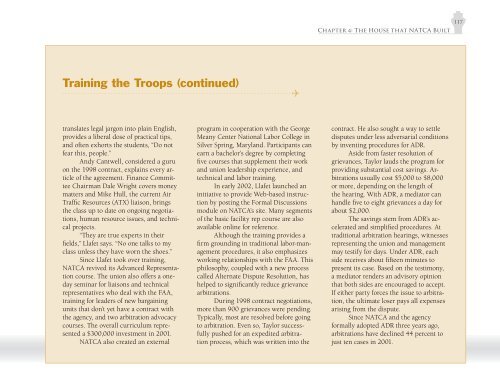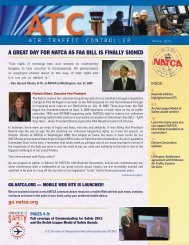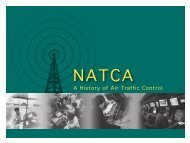Against the Wind - National Air Traffic Controllers Association
Against the Wind - National Air Traffic Controllers Association
Against the Wind - National Air Traffic Controllers Association
Create successful ePaper yourself
Turn your PDF publications into a flip-book with our unique Google optimized e-Paper software.
Training <strong>the</strong> Troops (continued)<br />
translates legal jargon into plain English,<br />
provides a liberal dose of practical tips,<br />
and often exhorts <strong>the</strong> students, “Do not<br />
fear this, people.”<br />
Andy Cantwell, considered a guru<br />
on <strong>the</strong> 1998 contract, explains every article<br />
of <strong>the</strong> agreement. Finance Committee<br />
Chairman Dale Wright covers money<br />
matters and Mike Hull, <strong>the</strong> current <strong>Air</strong><br />
<strong>Traffic</strong> Resources (ATX) liaison, brings<br />
<strong>the</strong> class up to date on ongoing negotiations,<br />
human resource issues, and technical<br />
projects.<br />
“They are true experts in <strong>the</strong>ir<br />
fields,” Llafet says. “No one talks to my<br />
class unless <strong>the</strong>y have worn <strong>the</strong> shoes.”<br />
Since Llafet took over training,<br />
NATCA revived its Advanced Representation<br />
course. The union also offers a oneday<br />
seminar for liaisons and technical<br />
representatives who deal with <strong>the</strong> FAA,<br />
training for leaders of new bargaining<br />
units that don’t yet have a contract with<br />
<strong>the</strong> agency, and two arbitration advocacy<br />
courses. The overall curriculum represented<br />
a $300,000 investment in 2001.<br />
NATCA also created an external<br />
<br />
program in cooperation with <strong>the</strong> George<br />
Meany Center <strong>National</strong> Labor College in<br />
Silver Spring, Maryland. Participants can<br />
earn a bachelor’s degree by completing<br />
five courses that supplement <strong>the</strong>ir work<br />
and union leadership experience, and<br />
technical and labor training.<br />
In early 2002, Llafet launched an<br />
initiative to provide Web-based instruction<br />
by posting <strong>the</strong> Formal Discussions<br />
module on NATCA’s site. Many segments<br />
of <strong>the</strong> basic facility rep course are also<br />
available online for reference.<br />
Although <strong>the</strong> training provides a<br />
firm grounding in traditional labor-management<br />
procedures, it also emphasizes<br />
working relationships with <strong>the</strong> FAA. This<br />
philosophy, coupled with a new process<br />
called Alternate Dispute Resolution, has<br />
helped to significantly reduce grievance<br />
arbitrations.<br />
During 1998 contract negotiations,<br />
more than 900 grievances were pending.<br />
Typically, most are resolved before going<br />
to arbitration. Even so, Taylor successfully<br />
pushed for an expedited arbitration<br />
process, which was written into <strong>the</strong><br />
Chapter 4: The House that NATCA Built<br />
contract. He also sought a way to settle<br />
disputes under less adversarial conditions<br />
by inventing procedures for ADR.<br />
Aside from faster resolution of<br />
grievances, Taylor lauds <strong>the</strong> program for<br />
providing substantial cost savings. Arbitrations<br />
usually cost $5,000 to $8,000<br />
or more, depending on <strong>the</strong> length of<br />
<strong>the</strong> hearing. With ADR, a mediator can<br />
handle five to eight grievances a day for<br />
about $2,000.<br />
The savings stem from ADR’s accelerated<br />
and simplified procedures. At<br />
traditional arbitration hearings, witnesses<br />
representing <strong>the</strong> union and management<br />
may testify for days. Under ADR, each<br />
side receives about fifteen minutes to<br />
present its case. Based on <strong>the</strong> testimony,<br />
a mediator renders an advisory opinion<br />
that both sides are encouraged to accept.<br />
If ei<strong>the</strong>r party forces <strong>the</strong> issue to arbitration,<br />
<strong>the</strong> ultimate loser pays all expenses<br />
arising from <strong>the</strong> dispute.<br />
Since NATCA and <strong>the</strong> agency<br />
formally adopted ADR three years ago,<br />
arbitrations have declined 44 percent to<br />
just ten cases in 2001.<br />
117




